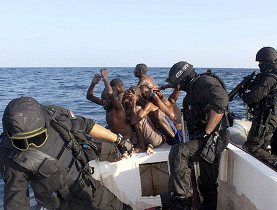
August 2012
In 2009, the Federal Assembly of Switzerland voted against taking part in Operation Atalanta, a European Union Naval Force effort to prevent and combat acts of piracy in the Indian Ocean.
This decision, however, apparently does not prevent private Swiss shipping companies from hiring their private security firms to secure their cargo. Surely, there are some in Switzerland that disapprove of the resort to violence, but that’s not stopping the merchants, who face a very real problem.
Lukas Roth, the head of the commercial shipping department of the Swiss foreign ministry told journalists that “The long-term custom of commercial ships being unarmed has to be thrown overboard. No Swiss operator wants armed soldiers on board their boats. [But] ships from the Swiss commercial fleet also have armed guards from private security companies.”
Only some ships are using these methods, however. According to Roth, they are only necessary on the most dangerous of routes, and their cost is over $45,000 USD per week. Others have used the military security provided by ships participating in Operation Atalanta to save themselves from pirates.
Although Operation Atalanta and the use of private security is having the effect of lowering the number of piracy incidents, slow moving merchant vessels are still at risk. Low to the ground, large and often crewed by small crews, these are still prime targets for pirates. Hostages are also a common avenue for pirates to cash in. There are currently over 200 people held captive by pirates.
Although Switzerland is a land-locked country, it still plays a big role in global trade. The Mediterranean Shipping Company, which is based in Geneva, accounts for over 10 per cent of international shipping.
The industrious and very enterprising nation is ranked up there with France and Denmark as one of the most prominent global shippers.